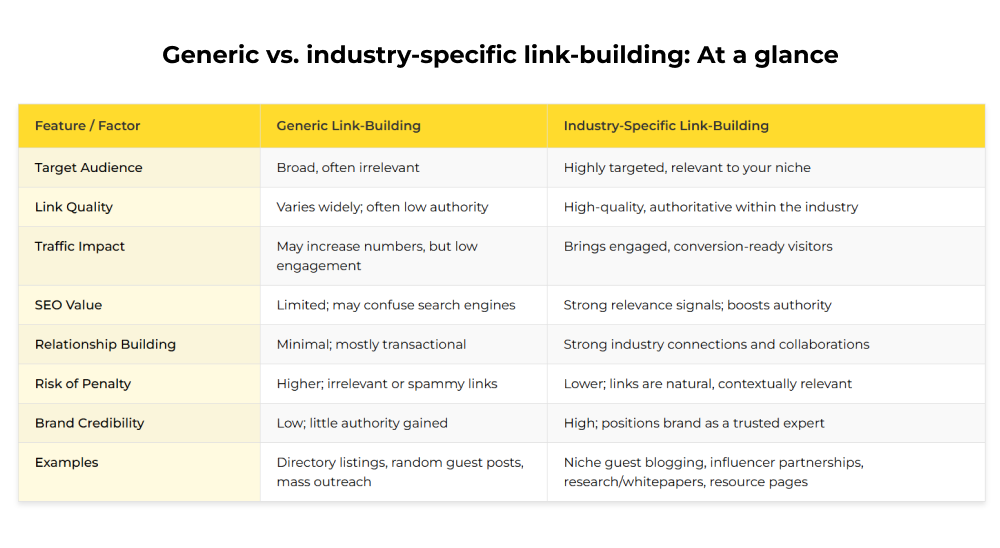So, suppose you’re attending a massive networking event. Everyone’s handing out business cards, shaking hands, and talking over each other. You leave with a fat stack of contacts… but when you look closely, most of them aren’t remotely useful. A wedding photographer from another city, a plumber, and a student with a startup idea in gaming. Nice people, but will they actually help your SEO career or your business grow? Probably not.
Now, picture a different scenario. You’re in a room filled only with your industry peers. You’re meeting bloggers, thought leaders, and experts who genuinely care about the same niche as you. Every connection you make has the potential to open a meaningful door.
That’s exactly what industry-specific link building feels like.
Generic link-building is that noisy networking event with lots of links, very little impact. Industry-specific link building, on the other hand, is the laser-focused mastermind session that drives relevance, authority, and long-term SEO wins.
At Mavlers, we’ve helped 50+ clients worldwide secure over 10,000 high-quality, industry-relevant backlinks, and here’s the truth: it’s not about chasing any link; it’s about chasing the right ones.
So, if you’ve ever caught yourself wondering:
- “Why isn’t my link-building moving the needle?”
- “Why does my traffic look busy but conversions stay flat?”
- “What am I missing that competitors seem to get right?”
Stick around, because by the end of this guide, you’ll understand how to build links that actually matter and avoid wasting months on tactics that look good on paper but do nothing for your bottom line.
Decoding the “why bother?” moment: Understanding link building in the real world
Allow us to paint you a picture from our own experience. We once worked with a SaaS client whose team had been promised the moon by a “link-building expert.” Within three months, they had 200 backlinks, mostly from generic lifestyle blogs, low-authority directories, and completely irrelevant sites.
The result? Google wasn’t impressed. Traffic increased slightly, but conversions remained steady. And, to make things worse, a couple of those links actually triggered a minor penalty scare.
That’s the harsh truth about generic link-building: volume does not equal value.
Link building isn’t about collecting links like baseball cards. It’s about building trust signals for search engines and relevance signals for humans. When you get it right, Google notices. Your audience notices. Your competitors? They notice too, and suddenly, your brand isn’t just “another player.” You’re the authority everyone is talking about.
On that note, we recommend reading our detailed offering on ‘Solving the Ultimate Dilemma in Link Building: Quality vs. Quantity.’
If you are wondering about the safe number range of backlinks to aim for, you may be interested in exploring ‘How Many Backlinks Per Day Is Safe?‘ ~ The Smart Marketer’s Guide To Link Building Without Penalties.
Generic link building: The trap everyone risks falling into
We’ve all been there. The pitch is simple: “We’ll get you 100 links in 30 days!” Sounds amazing, right? But here’s the kicker: generic links often bring generic traffic.
- You’re a fitness brand. You get a backlink from a tech blog. Visitors click, realize it has nothing to do with their interests, and bounce in 2 seconds. Google sees that. Your rankings? Not thrilled.
- Random directories and low-quality sites? They don’t care about your niche, and they don’t care about your conversions. Worse, a few shady links can damage your site’s credibility.
The takeaway is that irrelevant links are a trap. They might give you a tiny bump, but in the long term, they create confusion for both search engines and your audience. On that note, here is something you need to be wary of: Link Building Scams – How to Spot and Eliminate Them.
Why industry-specific link building actually works
Here’s the deal: generic link-building is like shouting into a crowded stadium. However, industry-specific link-building is a different ball game altogether.
That’s walking into a room where everyone already gets what you do, and suddenly, every handshake, every nod, every mention actually counts.
Let us break it down:
~ Relevance coupled with authority translates into SEO gold
As discussed earlier, Google no longer just counts links. It’s smart and wants context. A backlink from a well-known competitor, a niche blog, or a trusted partner tells Google, “Yep, this brand knows its stuff.” That’s like a booster shot for your rankings, one link, and your site gets a credibility glow-up.
~ Traffic that actually cares
Here’s where most marketers trip up: not all traffic is equal. A boutique coffee shop linked by a popular coffee blog isn’t just getting clicks; it’s getting people who are already invested. They’re sipping their latte, nodding along, thinking, “I need this in my life.” That’s the kind of traffic that actually converts.
~ Brand credibility on steroids
When the right people link to you, suddenly you’re no longer “just another site.” You’re the one people quote, the one other blogs reference, the one journalists ping for insights. Your brand becomes the authority, and the links start building themselves because everyone wants a piece of your expertise.
In short, you gotta stop chasing those vanity numbers. Start chasing the right room, the right people, the right links. That’s where the real SEO magic happens.
Check out an honest and unbiased comparison between generic vs. industry-specific link-building endeavors.

How to actually do it: Proven industry-specific link-building tactics
Alright, enough theory, let’s get tactical. Here’s how you actually go about building links that matter, the kind that boost relevance, authority, and SEO performance.
1. Partnering with industry leaders
This is all about building real relationships, not just chasing links. Consider partnering with influencers, thought leaders, or respected brands in your niche. You may choose to collaborate on co-authored content, joint webinars, podcasts, or resource-sharing. These connections generate high-quality backlinks, signaling credibility to search engines.
Pros:
- Strengthens your industry network
- Opens doors for co-marketing opportunities
Cons:
- It can be time-intensive because relationships don’t build overnight
- Requires alignment of goals and brand values
On that note, contrary to popular belief, micro-influencers often outperform big-name personalities because their audience is niche, loyal, and genuinely engaged.
2. Guest blogging on niche sites
Guest blogging isn’t dead; it just needs to be smarter. You need to focus on well-established, industry-specific platforms where your target audience congregates. This isn’t about volume; it’s about securing quality and relevance.
Pros:
- Direct access to a highly targeted audience
- Strengthens your reputation as an expert in the field
Cons:
- Competitive, because only top-notch content gets accepted
- Editorial standards can be strict, so your content must really deliver
We recommend not to pitch just to get a backlink. Pitch to provide unique value. The links will follow naturally.
3. Creating industry reports and research
Nothing beats original data. Surveys, research reports, and whitepapers make you a thought leader in your niche. When other bloggers, media outlets, or businesses cite your findings, you get valuable backlinks and recognition.
Pros:
- Establishes authority and thought leadership
- Attracts high-quality, organic backlinks
Cons:
- Resource-intensive, requires time and expertise
- Must deliver genuinely valuable insights to gain traction
Even small surveys within your industry can create a shareable, link-worthy report if presented well.
4. Sponsorships and events
Sponsoring or participating in industry-specific events, such as webinars, panels, or conferences, can earn natural backlinks from event pages, media coverage, and post-event recaps.
Pros:
- Boosts brand visibility within your niche
- Creates opportunities for networking and further collaborations
Cons:
- Can be expensive
- Impact may be limited to the event timeframe
You may pair sponsorships with content promotion. For instance, a follow-up article summarizing your panel discussion can generate additional backlinks.
5. Resource page link-building
Resource pages are curated lists of valuable industry content. Getting your content featured here is like being recommended by a respected insider, long-lasting, evergreen backlinks that reinforce your authority.
Pros:
- Long-term backlink placement
- Positions your brand as a go-to resource in your niche
Cons:
- Requires high-quality, evergreen content
- It can be challenging to secure spots on well-established pages
You can start small with niche resource pages before pitching to the top-tier ones. Proven value increases your chances of acceptance.
If you need a deeper dive, consider reading ~ Link Building 101: A Guide to Effective Link Building Strategies With Examples.
Measuring success without getting lost in vanity metrics
Here’s the thing, fellas, links alone don’t matter. What matters is what they do for your site:
- Organic traffic from niche sites – Are you attracting the right audience?
- Domain authority improvements – Are high-quality links boosting your credibility?
- Referral traffic – Are visitors actually coming from the right places?
- Engagement & conversions – Are these visitors reading, signing up, or buying?
If you’re only counting links, you’re missing the point.
In case you want to know the KPI’s we use at Mavlers for link-building endeavors, you might want to read ~ Mavlers’ Link Building Success: What KPIs You Should Expect?
The hurdles (And how to dodge them)
Even the best strategy hits bumps. Here’s how we handle them:
1. Finding the right partners – Not all influencers or thought leaders will align. We recommend starting small, building relationships, and nurturing them over time.
2. Keeping content relevant – Your audience is smart. Therefore, generic content won’t cut it. Research trends, address pain points, and create content people actually want to share.
Here are a couple of detailed guides that might be of relevance and interest to you ~ Link Building Challenges and How to Overcome Them, Top 7 Link Building Mistakes to Steer Clear of in 2025.
The road ahead
So, while generic, mass-scale tactics may still float around, brands that want to win big will double down on industry-specific link-building.
At Mavlers, we’ve seen it firsthand: when clients shift from generic to niche-focused strategies, they don’t just see ranking boosts; they attract the right kind of traffic that converts.
So the real question is: Are you still wasting time at the noisy networking event, or are you ready to join the right room?
Get in touch with us today, and let’s start building the backlinks your brand truly deserves.


Priyadarshan Chomal - Subject Matter Expert (SME)
Priyadarshan is an Assistant Team Lead at Mavlers, specializing in SEO and Link-Building Services. He currently works for a client in the Health niche and focuses on acquiring quality resource links that help attract organic traffic. He has previously worked on penalty recovery projects and helped clients overcome Google penalties.
Naina Sandhir - Content Writer
A content writer at Mavlers, Naina pens quirky, inimitable, and damn relatable content after an in-depth and critical dissection of the topic in question. When not hiking across the Himalayas, she can be found buried in a book with spectacles dangling off her nose!
Laravel 12: An Early Look at the Future of Web Development
Kickstart Your SEO on a Limited Budget: How Mavlers Crafts Affordable Campaigns That Won't Break the Bank